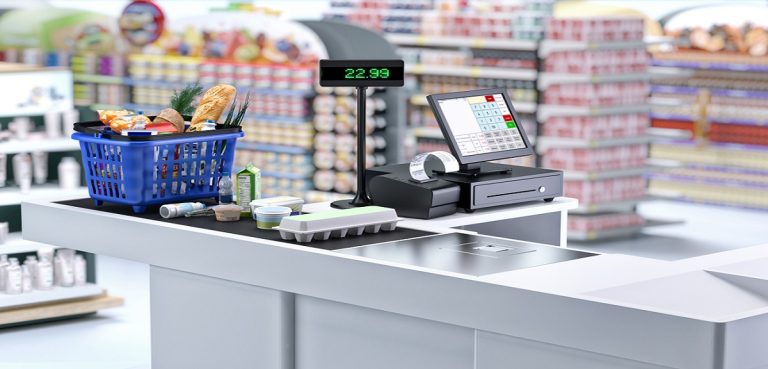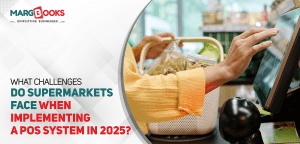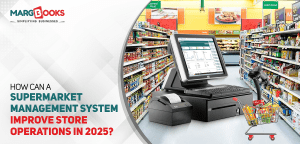In the modern retail landscape, efficiency and accuracy in managing sales and inventory are non-negotiable. Supermarkets, with their vast inventories and fast-paced operations, require reliable tools to ensure smooth functioning. Among these tools, supermarket billing software is the cornerstone of operational success. But when choosing billing software, the dilemma often boils down to two options: cloud-based or on-premises solutions. Which one is better for your supermarket? Let’s explore.
Understanding Cloud-Based and On-Premises Billing Software
Before diving into the comparison, it’s crucial to understand what these terms mean:
Cloud-Based Billing Software
Cloud-based software is hosted on remote servers and accessed over the internet. Users don’t need to install or maintain the software on their local machines. Instead, they pay a subscription fee to use it. Examples include solutions like Marg Books and other modern accounting software.
On-Premises Billing Software
On-premises software, on the other hand, is installed and operated from your local computers or servers. Businesses have full control over the system but must handle its maintenance, upgrades, and security.
Key Factors to Consider
To determine which option is better, it’s essential to evaluate them across critical factors like cost, accessibility, security, scalability, and more.
1. Cost
- Cloud-Based:
- Operates on a subscription model, making it a smaller upfront investment.
- No need for expensive hardware or IT infrastructure.
- Includes regular updates and maintenance in the subscription fee.
- On-Premises:
- Requires a significant upfront investment for hardware and software licenses.
- Ongoing costs include maintenance, upgrades, and IT staff salaries.
Verdict: Cloud-based billing software is more budget-friendly, especially for small to mid-sized supermarkets.
2. Accessibility
- Cloud-Based:
- Accessible from anywhere, as long as you have an internet connection.
- Perfect for multi-location supermarkets as data is centralized.
- On-Premises:
- Limited to the physical location of the installed software.
- Requires VPN or additional tools for remote access.
Verdict: Cloud-based solutions win for flexibility and remote accessibility.
3. Maintenance and Upgrades
- Cloud-Based:
- Regular updates and maintenance are handled by the service provider.
- Users always have access to the latest features and security patches.
- On-Premises:
- Requires manual upgrades and in-house IT expertise.
- Updates may involve downtime, disrupting supermarket operations.
Verdict: Cloud-based billing software offers hassle-free maintenance.
4. Security
- Cloud-Based:
- Data is stored on secure servers with enterprise-grade encryption.
- Regular backups reduce the risk of data loss.
- On-Premises:
- You have full control over your data, but security depends on your in-house measures.
- Risks include hardware failure or improper configurations.
Verdict: Both solutions have pros and cons, but cloud-based systems’ managed security is often more robust for smaller businesses.
5. Scalability
- Cloud-Based:
- Easily scales up or down as your supermarket grows or changes.
- Add users or features without significant changes to infrastructure.
- On-Premises:
- Limited by your existing hardware and software capabilities.
- Scaling may involve significant costs and time.
Verdict: Cloud-based software is inherently more scalable.
6. Internet Dependency
- Cloud-Based:
- Requires a stable internet connection for smooth operation.
- Offline billing features may not always be available.
- On-Premises:
- Operates independently of the internet.
- Ideal for areas with unreliable connectivity.
Verdict: On-premises solutions are better for locations with poor internet infrastructure.
Pros and Cons at a Glance
Cloud-Based Supermarket Billing Software
Pros:
- Low upfront costs
- Accessible from anywhere
- Automatic updates
- Easy scalability
Cons:
- Internet dependency
- Long-term subscription costs may add up
On-Premises Supermarket Billing Software
Pros:
- Full control over data
- No reliance on internet
Cons:
- High upfront costs
- Requires in-house maintenance
- Limited scalability
The Margbooks Advantage
If you’re looking for reliable cloud-based billing software, Margbooks offers a comprehensive solution tailored to Indian supermarkets. With features like inventory tracking, GST compliance, and integration with accounting software, it simplifies supermarket operations while ensuring data security and ease of use.
For those considering on-premises options, Marg also provides robust software solutions that cater to businesses with specific needs for in-house control.
Final Verdict: Which Is Better?
The choice between cloud-based and on-premises supermarket billing software depends on your supermarket’s specific needs:
- Choose cloud-based billing software if you prioritize accessibility, scalability, and low maintenance.
- Opt for on-premises billing software if you need complete control over your data and work in an area with unreliable internet.
For most supermarkets, cloud-based solutions like Margbooks strike the perfect balance between functionality, cost, and convenience. With the rapidly evolving retail landscape, staying ahead of the curve often means embracing the flexibility and efficiency of the cloud.




